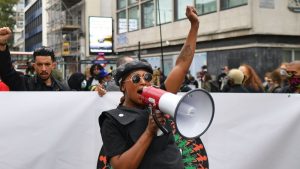
Posted on 04 March 2012 by Benjamin Phillips
Over 30 people were arrested when Occupy Oakland was raided on Monday morning. One of them was Cami G., a graduate student and a member of the media committee of OO. This is her account of the experience.
On February 1, 1960, four students from the all-black Agricultural and Technical College of North Carolina—Joseph McNeil, Franklin McCain, Ezell Blair, Jr., and David Richmond—strolled into the Woolworth store in downtown Greensboro, North Carolina, sat down at the lunch counter, and ordered coffee. Because of the counter’s “whites only” policy, they were refused. Several employees and a manager asked them to leave, but they remained until the store closed, when they peacefully dispersed.
The next day, the teenagers came back, this time joined by fifteen others. Again, they were refused service, and, again, they stayed until closing time. The next day, there were more than sixty demonstrators, and by the fourth day, over 300 people were participating in sit-ins at lunch counters across the city. By the following week, the movement had spread not only throughout the state but across the entire South. The sit-ins lasted for almost six months, and on July 25, due to boycotts, diminishing profits, and outside pressure prompted by the publicity of the sit-ins, Woolworth desegregated all of its stores, allowing blacks to sit at lunch counters and receive the same service as whites.
There were, of course, difficulties before this victory was achieved. On the very first day, one black employee accused the young men, now called the Greensboro Four, of hurting rather than helping race relations. The demonstrators were heckled and threatened by mobs, with some protests turning violent. Many years later in February of 2008, Franklin McCain discussed the danger of blacks demonstrating in the 1960s South: “I had pre-concluded if I were lucky, I would go to prison for a long, long time. If I were not so lucky, I would come back to my university campus in a pine box.” The four also lamented the difficulty of getting people to commit to sitting in the stores from open to close, to returning day after grueling day. Considering all this, one might ask why the right to be served lunch next to white people was important enough to risk their lives devoting five months to idle loitering. One might ask what sitting passively at a lunch counter was expected to accomplish when the enormity of race problems in the South was so overwhelming.
I would argue that small acts like these are the essential building blocks of successful dissent, but we can’t always see at first how they will factor in the account of history. In retrospect, we understand the impact of the Greensboro sit-ins; we know that four black students sitting at a Woolworth five-and-dime was the first domino in a chain that spread to parks, libraries, museums, beaches, and other facilities across the South. We know that it was the catalyst that led to the Civil Rights Act of 1964, which desegregated all public spaces. But on February 1, 1960, the Greensboro Four didn’t know that. They only knew that they were tired of talking, tired of waiting for somebody else to do something, and they were going to walk into the store and stand up for themselves by sitting down.
Very early on the morning of November 14, I stood on the edge of the Occupy Oakland encampment in Oscar Grant Plaza and listened to reports that hundreds of riot police were approaching. Admittedly, I was nervous, and I had plans to disappear the moment I faced the possibility of being arrested.
Yet, a few moments later as I watched the police close in, I began to think about what their presence meant, and I began to imagine the disappearance of the camp where I had spent so much of my time and made so many friends in the past weeks. It had all but emptied out as hundreds took to the intersection of 14th and Broadway, drumming and chanting, and the quiet that fell over the vacated tents was eerie. A group of people had silently linked arms at the Interfaith tent, surrounded by candles. Here and there, people sat, meandered aimlessly, packed their belongings, and even slept, but it wasn’t the bustling tent city I had begun to think of as a second home, where I could start a conversation with almost anyone, exchange ideas, hear peoples’ life stories or tell my own, be fed, pick through free books, meditate, learn yoga, listen to people sing and play instruments, and watch children play.
We all knew that there was nothing that we could do to stop what was coming—that we couldn’t defend the camp, and that the police would destroy it no matter what, and they would arrest as many of us as they needed to in the process. We had no choice but to acknowledge that the military arm of the local government was too powerful, and, judging by their billy clubs and tear gas guns, they weren’t afraid to commit violence as they had done before. Many in the camp had already gone to jail and couldn’t risk it again, and still others had jobs, school, and families which they couldn’t abandon to spend a day or more being detained for silly misdemeanors.
All of this led me to a feeling of profound despair. Our reluctant resignation and the imminent dismantling of the camp suddenly represented something more to me. It represented the forced invisibility of millions of people, the overwhelming majority of the planet’s seven billion people, in fact. And it represented the dehumanization of those near and dear to me, too. I thought primarily of my mother, who raised two children in abject poverty, often working more than one job, often tolerating the abuses of an alcoholic husband, often welcoming neighborhood kids into her home when their own homes became too volatile or unstable. This latter detail about my mother is what emerged most prominent in my mind—the fact that despite the obstacles in her way, the stresses of raising children and working constantly, and the paucity of her home and the environment in which we lived, she never closed her arms to anyone who needed her help, no matter their past, their problems, or their ideologies. Maybe it’s melodramatic, but my mother symbolizes for me a vision of Liberty, saying, “Give me your tired, your poor, your huddled masses yearning to breathe free!” Because of her, it is clear to me that Liberty is not a blue-blooded woman doling out charity from a safe distance but a fierce, penniless yet empowered, broken-but-not-beaten mother defending her children against the injustices of a system that functions without conscience or accountability.
I realized that what I had come to appreciate about the people at Occupy Oakland was that many of them shared this same attitude of unabashed goodwill and inclusivity. They were full of optimism and zeal. They often came to the camp with little but freely offered whatever they did have—bread, soup, energy bars, books, clothing, blankets, electronics, artwork, kind words, ideas, laughter, music, and prayers—so many commodified things (because yes, even prayer is a commodity, these days) were given purely out of the kindness of peoples’ hearts. We had begun to build a community, a real community!
Was it muddy and stinky? Sure. Were there disagreements and arguments? Of course. Was there even some drug use and unspeakable violence (which I will still argue was not prompted by the presence of the encampment)? Yes. But these are human problems, not problems exclusive to Occupy Oakland. In fact, the fetishization of these problems by the mainstream media, the government, and detractors is representative of the way in which the problems of the marginalized have always been used by those in power to further alienate and disenfranchise those deemed “undesirable”—as though these same problems don’t exist across socioeconomic boundaries and aren’t often a direct product of a long history of cultural and social denigration. I’ve heard many on the outside call us degenerates, but what I saw at the camp was the extraordinary capacity for human kindness. An incredible passion for justice. Each person made me proud. Each person in some way or another embodied the principles of Liberty that my mother, by her actions, taught me to value.
So when I imagined the cops tearing down those tents, I imagined them tearing down a home like the one my mother had made. Those in power didn’t want the camp gone because it was dangerous or a threat to public health; they wanted it gone because the people there lived their successes and their failures too publicly, right in front of City Hall where they could no longer be ignored. Those in power didn’t want to have to look at, to be forced to deal with the problems of homelessness, joblessness, poverty, and violence endemic to our society, just as they didn’t want to give us the opportunity to congregate and work together to build a new one. Those in power have their own agenda, and the possibility of our uniting against them to address the real, every day issues we face was too great. They’d rather see us disappear and suffer alone in silence and shame.
At that thought, I decided that I couldn’t abandon the camp. I may be one small person, but the very least I could do was try to be like Greensboro Four who decided that a minor act of passive resistance was better than nothing at all. Sitting for two-and-a-half-hours surrounded by riot police isn’t much. Spending ten hours in police custody napping and singing show tunes with a group of cheerful women, many of them clergy members, isn’t much. It isn’t much compared to what those who participated in the Civil Rights Movement faced fifty years ago, nor is it much compared to what protestors in Tunis, Cairo, and across the Middle East and North Africa face today. It isn’t the self-immolation of Mohamed Bouazizi. And it doesn’t seem to do much. It doesn’t do much to actively help the silent peoples from Oakland to Brazil to rural China who daily face the horrors of poverty, exploitation, sickness, and violence, or the middle class citizens who are finding themselves suddenly jobless and homeless. But it’s what I could do in the moment to show how much that camp meant to me, and how tearing it down was another act of aggression by the powers-that-be that was only going to strengthen my resolve. It was my way of extending solidarity to Occupy camps across the globe, which I think of as extended sit-ins. I couldn’t disappear. I refused to be ignored.
We won’t disappear. We must refuse to be ignored.
As Franklin McCain said forty years after he first sat down at the lunch counter at Woolworth in Greensboro, North Carolina: “This is my country… I fought for the chance to make it right. No one’s going to deny me the opportunity. I am going to be a full participant in every aspect of this community.” I think this is the goal of Occupy Oakland, no matter how they try and stop us.
Republished from the Occupied Oakland Tribune.







